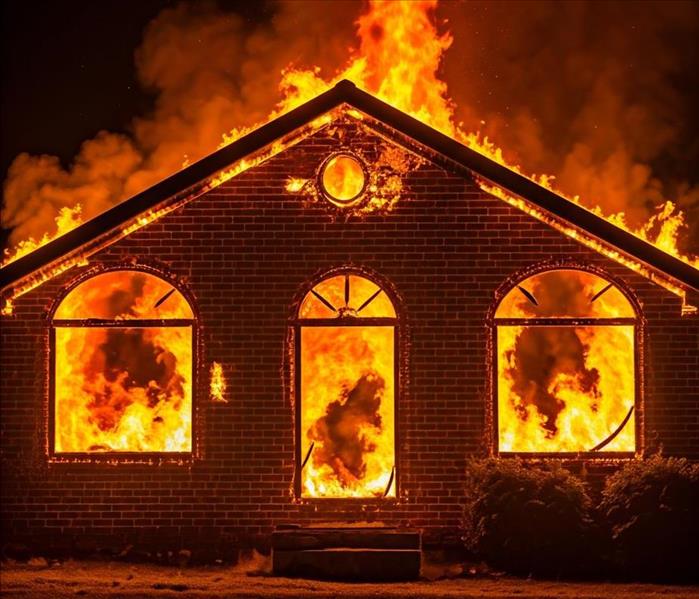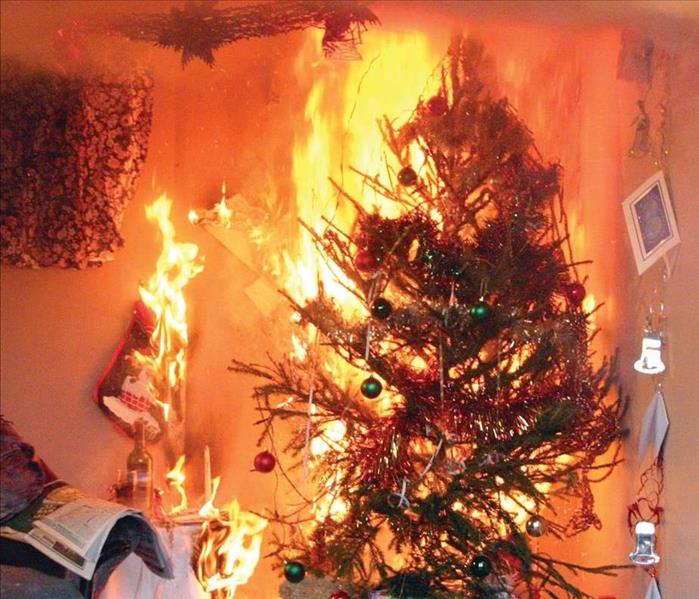Recent Fire Damage Posts
How to Avoid Fire Damage to Your Home During Dry Seasons
1/20/2025 (Permalink)
Dry seasons can be a dangerous time for home fires. The combination of dry weather, strong winds, and low humidity can create the perfect conditions for wildfires to spread quickly. In addition, many people use fireplaces and other heating sources more often during the dry season, which can also increase the risk of fire.
There are a number of things you can do to protect your home from fire damage during the dry season.
Here are some tips:
- Create a defensible space around your home. This means removing any flammable materials, such as leaves, branches, and mulch, from within 30 feet of your home.
- Keep your gutters clean. Clogged gutters can collect leaves and other debris, which can increase the risk of fire.
- Trim trees and shrubs near your home. This will help to reduce the risk of fire spreading to your home.
- Use caution when using fire in or around your home. This includes being careful when using fireplaces, campfires, and grills.
- Install and maintain smoke detectors and carbon monoxide detectors. These devices can help you to evacuate your home safely in the event of a fire.
- Have a fire escape plan. This will help you and your family to get out of your home safely in the event of a fire.
- Consider installing a sprinkler system. Sprinkler systems can help to extinguish fires quickly, which can reduce the amount of damage to your home.
- Be aware of fire restrictions. During the dry season, there may be restrictions on outdoor burning. Be sure to check with your local fire department before burning anything outdoors.
By following these tips, you can help to protect your home from fire damage during the dry season.
Additional tips:
- Sign up for a fire safety course. This will teach you how to prevent fires and how to escape from a fire safely.
- Install a home security system. This can help to deter burglars, who may be more likely to target homes during the dry season.
- Keep your home well-maintained. This includes repairing any leaks or other damage to your home.
- Be prepared to evacuate. If a fire threatens your home, be prepared to evacuate safely.
By following these tips, you can help to keep your home safe during the dry season.
Keep Your Holidays Fire Free
12/2/2024 (Permalink)
The holiday season is a time for joy, family, and festivities. However, it’s also important to prioritize safety. House fires are a common occurrence during this time, often caused by careless actions or faulty equipment. Here are a few tips to keep your home safe and your holidays happy:
Christmas Tree Safety:
- Choose a fresh, fire-resistant tree.
- Keep the tree well-watered.
- Place the tree away from heat sources like fireplaces and radiators.
- Turn off Christmas lights before going to bed or leaving the house.
Lighting Safety:
- Use only UL-listed lights.
- Check lights for frayed wires or broken bulbs before using them.
- Never overload outlets.
- Avoid using candles unattended.
Cooking Safety:
- Never leave cooking unattended.
- Keep children and pets away from cooking areas.
- Keep pot handles turned inward to avoid accidental spills.
- Clean up spills immediately.
By following these simple tips, you can enjoy a safe and happy holiday season.
Preventing Heating Fires
2/8/2024 (Permalink)
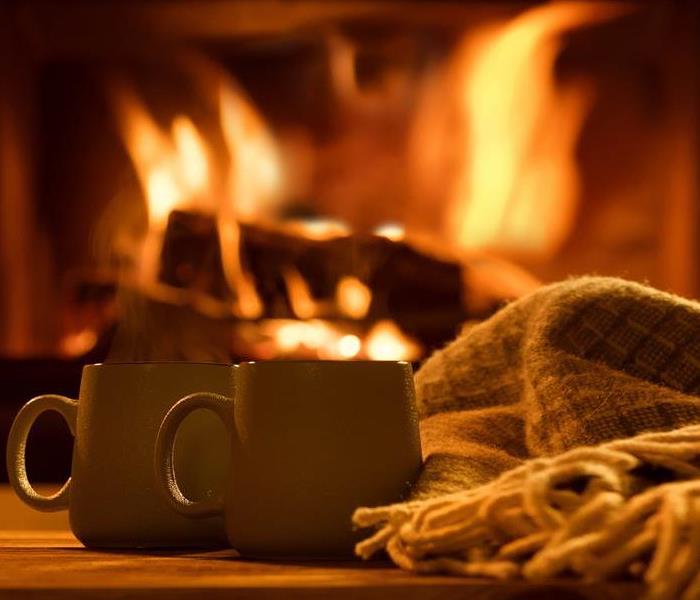 Heat your home safely this season as cold outdoor temperatures persist.
Heat your home safely this season as cold outdoor temperatures persist.
While modern heating systems are designed to be more efficient and have built-in safety features that minimize the risk of fires, it is crucial to note that heating fires can still occur due to various factors.
Is your property at risk? Let us help you get prepared with our checklist of preventative measures. But remember, if your property does undergo damage, we are open 24/7, 365 days a year to help you through it and to make it "Like it never even happened."
Overall, there has been a decline in heating fires over the years, however, they still pose a significant risk to homes and individuals. By remaining vigilant, staying informed about safety measures, and taking proactive steps to maintain heating systems, we can continue to reduce the occurrence of these devastating incidents.
Checklist for preventing heating fires
- Heat source proximity - Keep anything that can burn at least three feet from all heat sources including fireplaces, wood stoves, radiators, portable heaters, or candles.
- Electrical issues - Always plug space heaters directly into an outlet, and make sure its cord isn’t damaged or frayed.
- Improper usage - Never use an oven to heat your home.
- Maintenance - Maintain heating equipment and chimneys by having them cleaned and inspected each year by a professional.
- More information - Visit the U.S. Fire Administration Home Fires page to learn about how to prepare for and prevent home fires including tips for individuals with disabilities and older adults.
source: Ready.gov
Was this helpful? Leave us a review to let us know!
https://www.wereyouhappy.com/review2/SERVPRO-of-west-knoxville
Fire Prevention for Homes and Businesses
12/7/2023 (Permalink)
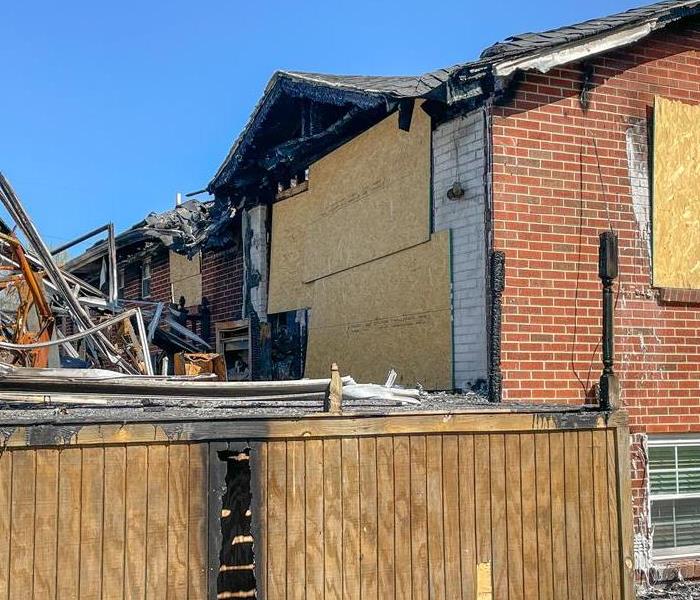 The effects of a fire can be devastating.
The effects of a fire can be devastating.
If you didn't know, it's National Fire Prevention Week. As much as we here at SERVPRO are here to help clean up after fires, our priority is always to help prevent them in the first place. So, we want to share some tips with you that will help keep you and your loved ones safe.
Fire is one of the most devastating disasters that can strike a home or business. It can cause extensive damage to property and possessions, and can even lead to loss of life. That's why it's important to take steps to prevent fires from happening in the first place.
Here are some fire prevention tips for homes and businesses:
Home fire prevention tips:
? Install smoke alarms on every level of your home, inside bedrooms and outside sleeping areas. Test your smoke alarms every month and change the batteries every year.
? Create and practice a fire escape plan with your family.
? Keep flammable materials away from heat sources.
? Be careful when cooking and using candles.
? Never smoke in bed.
? Have your electrical wiring and appliances inspected regularly by a qualified electrician.
Business fire prevention tips:
? Install smoke alarms and carbon monoxide detectors throughout your business. Test your alarms every month and change the batteries every year.
? Create and practice a fire escape plan with your employees.
? Keep flammable materials away from heat sources and electrical equipment.
? Be careful when using appliances and equipment.
? Have your electrical wiring and appliances inspected regularly by a qualified electrician.
How SERVPRO can help after a fire
If a fire does happen, it's important to call a qualified fire restoration company as soon as possible. SERVPRO is a leading provider of fire restoration services. We have over 2,000 franchises across the United States and Canada, so we're always nearby to help when disaster strikes.
Our team of highly trained and experienced professionals is equipped to handle all aspects of fire restoration, including:
? Emergency water removal
? Structural drying
? Smoke and odor removal
? Content cleaning and restoration
? Construction services We work with your insurance company to make the claims process as easy and stress-free as possible. We also offer 24/7 emergency service, so you can always count on us to be there for you when you need us most.
If you have experienced a fire, contact SERVPRO today. We're here to help you get your home or business back to normal as quickly as possible.
Additional fire prevention tips:
? Educate your family and employees about fire safety. Make sure everyone knows what to do in case of a fire.
? Have a fire extinguisher on every level of your home or business and know how to use it.
? Keep your fire extinguishers in good working order by inspecting them regularly and having them serviced by a professional.
? Consider installing a fire sprinkler system. Fire sprinkler systems can help to extinguish fires quickly and prevent them from spreading.
By following these fire prevention tips, you can help to protect your home or business from the devastating effects of fire.
How Many Smoke Alarms Should You Have
12/12/2022 (Permalink)
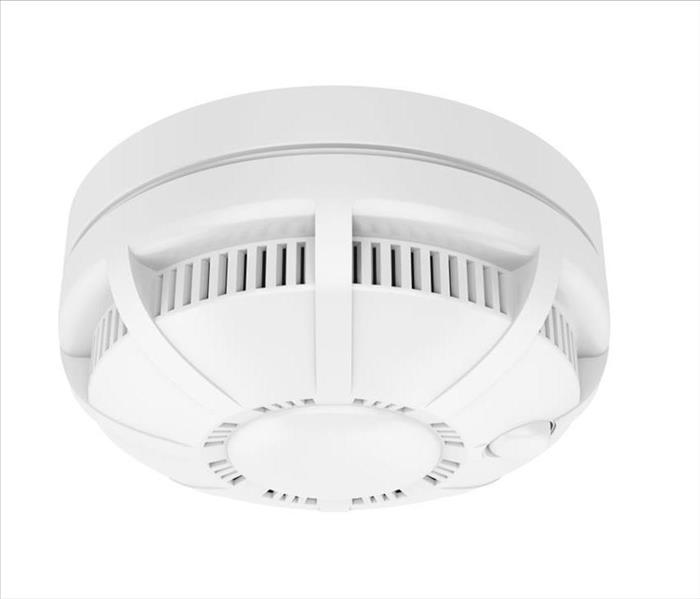 Ionization alarms tend to be better at detecting fast-burning fires
Ionization alarms tend to be better at detecting fast-burning fires
Keeping your home safe from the threat of fire can be a tricky proposition. After all, fires don't always happen when you're home — so how can you keep yourself and your loved ones safe? One simple way is to install smoke alarms in each room of your house. But how many smoke alarms should you have? And where should they go? Read on for answers to these questions, plus tips for choosing the best type of alarm for your home.
How many smoke alarms should I have in my home?
The National Fire Protection Association (NFPA) recommends that you have at least one smoke alarm on every level of your home, including the basement. The NFPA also recommends placing one outside each sleeping area and in each bedroom.
Additionally, there should be one smoke alarm in the kitchen and another in your basement or other areas below grade level. This is especially important for older homes with original wiring and electrical panels that could be easily damaged by water or fire.
Where should smoke alarms be installed?
The number of smoke alarms you should have depends on the layout of your home and how many sleeping areas you have.
If you live in a multi-story apartment building or condo building with an elevator or staircase, follow these guidelines:
Install at least one ionization or photoelectric/photoionization combination smoke detector per floor. You can add additional alarms if desired; this is up to local code requirements for multi-family residences (not just single-family houses).
All bedrooms should be within 10 feet of a functioning smoke detector, regardless of which type it is (i.e., ionization or photoelectric/photoionization combination). If this does not work for some reason (e.g., if there is already another working unit installed), consult with local fire officials about alternative solutions that would still meet safety regulations while also allowing for proper functioning of all other devices throughout restful periods such as nighttime when most people are asleep anyway so alarms aren't going off every time someone sneezes while watching TV before bedtime
What type of smoke alarm should I install?
You should have both ionization and photoelectric smoke alarms in your home. The reason is that both types of detectors can help you detect a fire and alert you to the danger more quickly. Ionization alarms tend to be better at detecting fast-burning fires, while photoelectric alarms are better at detecting slower burning fires.
However, there are some exceptions to this rule:
- If you live in an apartment building, landlords must install ionization smoke detectors only if they want their tenants to receive federal assistance for housing. In either case, it’s up to state laws where landlords will be required (or not) to install both types of detectors.
- If you live in a mobile home or trailer park, it’s recommended that all homes have dual-sensor technology installed by law. This includes ionization and photoelectric devices which will protect residents against both fast-burning house fires as well as small cooking fires that may start on stoves or hot plates
Houses with more than one story should have at least one smoke alarm on each level, as well as in each bedroom. If you're building a new home or renovating an existing one, make sure there are enough smoke detectors and they are working properly before moving in.
The Responsible Host’s Fire Safety Guide for Thanksgiving Day
11/17/2022 (Permalink)
Being aware of the possibility of fires, practicing safety measures to prevent fires, and knowing what to do in the event of a fire are important responsibilities for anyone who is hosting a Thanksgiving celebration.
As you prepare for the upcoming Thanksgiving Holiday and begin to plan the details for your gathering, be it big or small, exuberant or relaxing, there are several safety tips to keep in mind to promote a safe environment for you, your family, and/or your friends (and your furry family too!).
How likely am I to have a fire on Thanksgiving Day?
According to The U.S. Fire Administration, cooking fires cause the most Thanksgiving Day fires in residential buildings, occurring more often on Thanksgiving Day than any other day of the year. On Thanksgiving Day, 74% of fires in residential buildings were caused by cooking followed by 8% of fires caused by heating. By comparison, cooking caused 51% of residential fires that occurred on all days of the year other than Thanksgiving. Over half (54%) of Thanksgiving Day fires occur between 10 a.m. and 5 p.m. when people are preparing Thanksgiving dinner.
Tips for preventing kitchen fires.
- Never leave your range or cooktop unattended while cooking. If you have to leave the room, turn your range or cooktop off.
- Wear short, close-fitting or tightly rolled sleeves. Loose clothing can hang down onto hot surfaces and can catch fire if it comes in contact with a gas flame or electric burner.
- Keep your cooking area clean and free of combustible materials. Food wrappers, oven mitts or other materials left on or near the stove may catch fire.
- Be sure to clean up any spilled or splattered grease. Built-up grease can catch fire in the oven or on the cooktop.
- Keep a fire extinguisher readily available. Having an extinguisher nearby is important, but you also need to have the correct type of extinguisher and know how to properly use it.
- Never throw hot grease in the garbage as it can ignite combustible materials. Be sure to let grease cool and consider disposing it in an old can, such as a metal coffee can.
- Do not store food or other items in your oven. It can be easy to forget there is an item in your oven, and this could catch fire while preheating.
What to Do If a Cooking Fire Flares Up
By exercising caution in your kitchen, you can help reduce the risk of a kitchen fire. But if a fire does flare up, you need to be prepared.
- Your safety comes first. If you cannot safely extinguish the fire, leave the scene, call 911 for help, and let the fire department control the fire.
- If a small fire flares up and you are going to try to extinguish it, call 911 for help first. A fire may grow out of control more quickly than you anticipate. It is safer to have help already on the way.
- Smother a grease fire – never throw water on a grease fire. The water can be superheated and change to steam, and can cause severe burns. Also, it can cause oil to splash up and spread the fire. If a grease fire starts in a pan, smother the flames by sliding the lid – while wearing an oven mitt – over the pan. If it is safe to do so, turn off the heat source. Do not move the pan; keep the lid on until the fire is out and the pan is completely cool.
- If a fire starts in your oven, KEEP THE DOOR CLOSED & TURN OFF THE HEAT SOURCE. Keeping the door closed will help smother the flames. Do not open the door until the flames are completely out.
- If a fire starts in your microwave, turn off the microwave and do not open it until the fire is completely out. Unplug the microwave only if you can safely do so.
With these safety precautions in place and the knowledge of how to handle a kitchen fire, you are one step closer to being a responsible host.
Cheers and Happy Thanksgiving
to all of you responsible hosts out there!
From SERVPRO of North Knoxville
Was this helpful? Leave us a review to let us know!
https://www.wereyouhappy.com/review2/SERVPRO-of-north-knoxville
How To Prevent Grill Fires
7/25/2022 (Permalink)
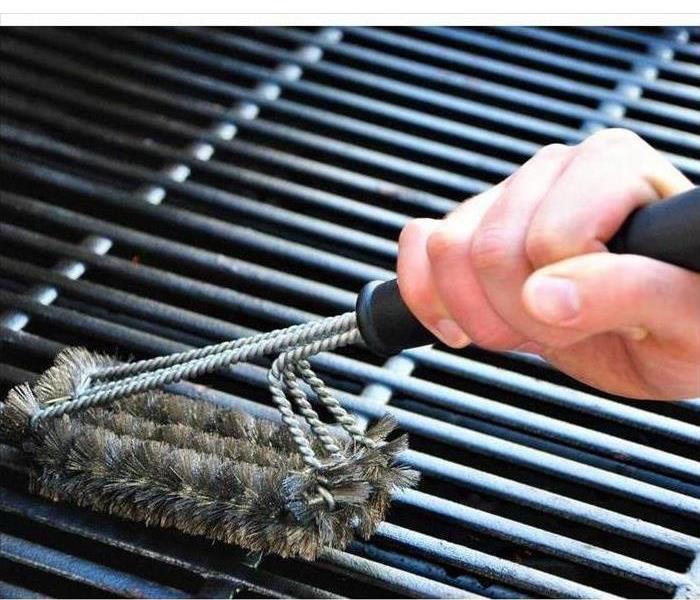 Clean your grill frequently to avoid a fire in your home.
Clean your grill frequently to avoid a fire in your home.
Prevent A Barbeque Fire
Grilling is a fun activity that brings families and friends together to enjoy great food and time outside. If you aren't careful, however, a grill fire may occur, potentially causing injuries and smoke damage. Here's how you can prevent a barbeque fire.
Know-How To Put Out a Fire
Knowing how to put a fire out and having the right supplies on hand is just as important as preventing fires. Here are some tips:
- If the propane tank is on fire, get as far away as you can and call the fire department.
- Cut off oxygen by closing the grill's lid.
- Turn the grill off if possible.
- If the fire does not stop, spray it with a fire extinguisher or cover it in baking soda to cut off the oxygen.
After the fire is extinguished, call a fire damage repair service in Heiskell, TN, to repair any damage that might have affected nearby buildings.
Choose a Safe Location
To prevent fires from spreading to your home, operate the grill at a safe distance away from the building. Avoid grilling on a balcony, patio, deck or other areas that are close to your house. Instead, position the grill in a clear area of your yard.
Clean the Grill Frequently
Burnt remnants on the grill can catch fire easily. After you are done grilling, allow the grill to fully cool and then thoroughly clean it. Always check that it is clean before turning it on.
Trim the Fat
While some fat on your meat is a good thing, excess fat can be a fire hazard. These fatty areas catch fire easily, causing flare-ups that can turn into a fire if you aren't careful. Trimming away excess fat can help reduce this risk. You can also keep a spray bottle of water near the grill to put out small flare-ups, but never pour large amounts of water onto a grill fire.
It's easy to prevent grill fires by grilling far from the building, cleaning the grill frequently, and trimming excess fat. You should also know how to put out a barbeque fire in case one occurs.
The Importance of Smoke Odor Remediation After a Fire
5/25/2022 (Permalink)
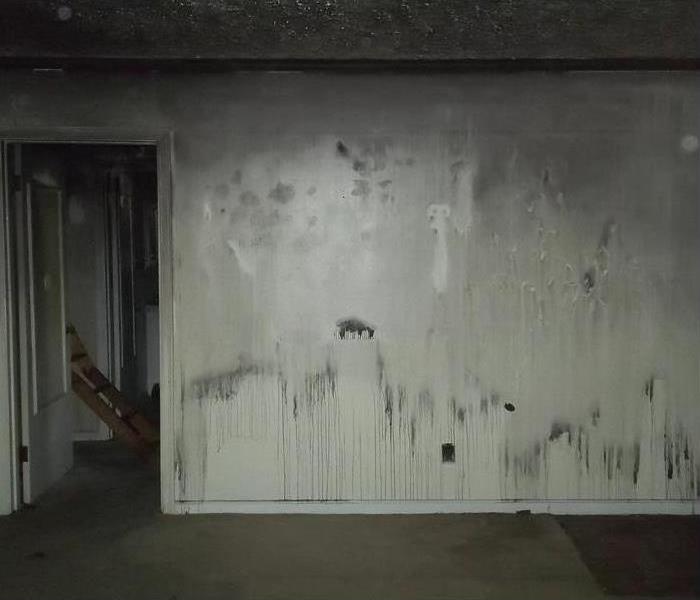 Soot and smoke damage after a fire in a home in Halls Crossroads, TN
Soot and smoke damage after a fire in a home in Halls Crossroads, TN
Smoke Odor Remediation After a Fire
The approximately 350,000 home fires that happen each year in the U.S. range from small fires to complete burndowns, but nearly all of them have one thing in common: the presence of smoke odors. As many homeowners know, getting rid of a pervasive smoke smell is not always easy. Home techniques and ordinary cleaning companies often do not utilize the proper equipment or methods. Professional smoke cleaning is often necessary. Experts identify persistent smells through testing and understand the science needed to remove odors without leaving a trace. A trained and certified fire restoration company in Halls Crossroads, TN, will not take shortcuts or settle for temporary solutions to an odor problem.
Specialized Equipment for Smoke Damage
The right training and equipment are needed to tackle pervasive odors after a fire. An odor control technician has the following tools at his or her disposal:
- Air filtration devices
- Ozone machines
- Thermal foggers
- Industrial air scrubbers
- Effective cleaning and sanitizing agents
Some or all of these are used in professional smoke cleaning after a home fire. It is also important to match the optimal cleaning methods for any soiled fabrics or surfaces. For example, experienced technicians know that sending damaged garments out for ordinary dry cleaning can lock in smells and make them harder to eliminate.
Advanced Methods for Total Fire Remediation
The removal of soot damage and smoke odor from all surfaces is just one part of a comprehensive cleanup. Much effort is put into cleaning and repair of household items and structures after a fire. The final restoration process often includes repairs to drywall, painting and carpeting. After major fires, whole rooms might need to be reconstructed. It is crucial that everything in the home is restored to its best possible condition. Quality smoke cleaning makes sure that odors are eliminated and that homeowners can enjoy their homes with complete satisfaction.
3 Ways to Keep Your Home Safe From Fire Hazards
4/17/2022 (Permalink)
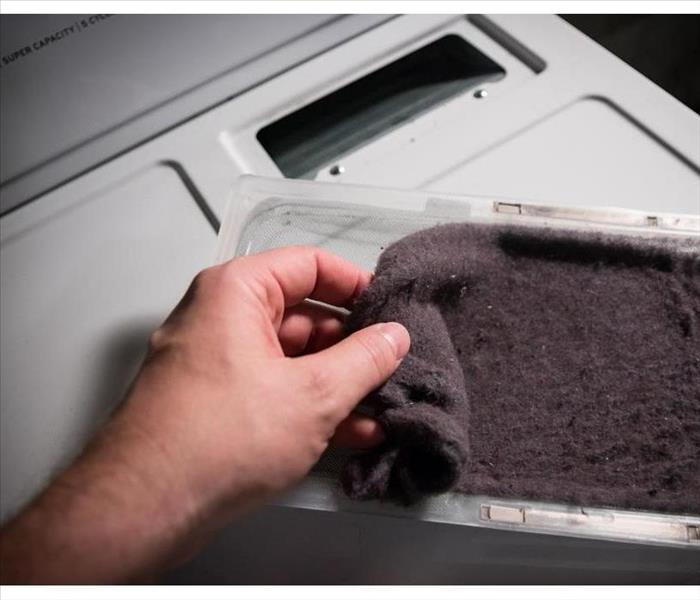 Lint is a highly flammable and common household nuisance.
Lint is a highly flammable and common household nuisance.
Minimize the Risk Of a Home Fire
Homeowners in Powell, TN, may not think twice about bringing potential fire hazards into their homes. Some are so commonplace it is habitual to purchase them or ignore them in the home. Common fire hazards include:
Simple changes, such as using candle alternatives, can minimize the risk of a fire. Here are a few ways to keep your home safe from fire hazards.
1. Properly Handle Cooking Oils
Many fires begin with improperly handled cooking oils. When you are cooking, never leave hot oil unattended. It takes less than 30 seconds for it to ignite once it begins smoking. To prevent a grease fire, heat the oil slowly in a pan and do not place frozen foods directly in the hot grease. Storing salt nearby is helpful to quickly douse a grease fire.
2. Avoid Using Open Flame Candles
An open flame is a potential fire waiting to happen. Wick candles are a common cause of house fires. Using candle alternatives is an excellent way to prevent this risk. Some include essential oil diffusers, electric wax warmers, and plugins. Each has its unique benefits so be sure to research which is most suitable for your home. The best way to prevent a candle fire is to utilize flameless alternatives.
3. Keep Dryer Vents Clean
Lint is a highly flammable and common household nuisance. When lint clogs the dryer vent, it begins to accumulate inside of the vent and the exhaust hose. If this is neglected for too long, it could spell a disaster for homeowners. A small spark near lint will cause a terrible house fire. To prevent a lint fire, contact a professional to service your dryer at least once a year.
Prevent fire risks by keeping these hazards out of your home. Practicing safe cooking methods, using candle alternatives, and servicing your dryer are all excellent ways to create a safe home environment. If you are in need of a fire damage restoration service, contact your local professionals to help.
Prepare Your Children to Escape a House Fire
2/25/2022 (Permalink)
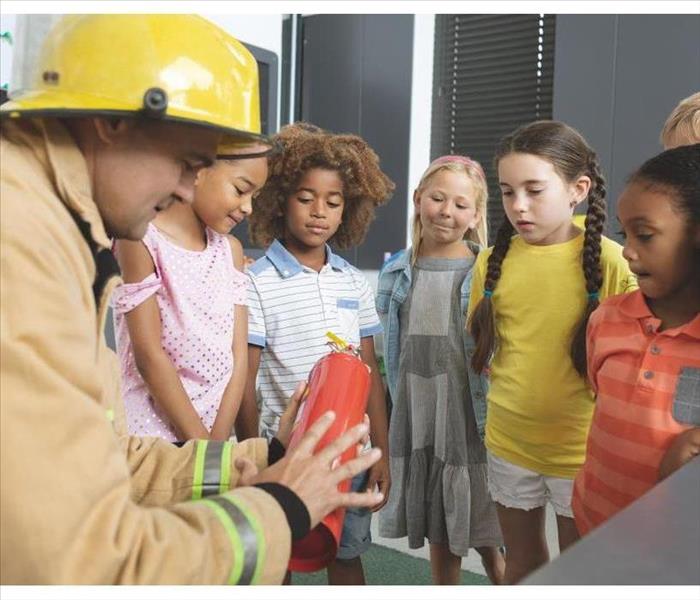 Kids safety training.
Kids safety training.
Kids' Safety In a Fire
You can’t talk about kids' safety in a fire without first covering the basics. Try to have the following in place before setting up evacuation plans for the children.
- Smoke and fire detectors positioned for fastest notification of a fire
- A whole-house fire escape plan
- An assessment of the capabilities of each child
Understand How Much Responsibility Each of Your Children Can Handle
A home fire is terrifying. We all know adults who are useless in a crisis and would need rescuing. We all know a 6-year-old who would escape unassisted and be the first one to the meeting point. The point here is not to expect any child to do more than their ability allows.
Determine Which Children Can Take the Minimum Required Action
Infants and toddlers cannot evacuate themselves. Some older children may have the same problem. For the kid's safety, you want to give them as much information and responsibility as they can handle. Following are the simple steps you should try to teach your children:
1. Roll out of bed to the floor and stay low. This action is dangerous from a high twin bed or a top bunk. Those children should safely get to the floor any way they can.
2. Crawl to the door. Air quality, visibility and temperature are best at floor level. Stay low.
3. Check the door to see if it is hot. Do not open if it is. Call for help. Repeat at every door along the escape route.
4. Open the door a little and check for smoke. Close if smoke is a problem. Call for help. Repeat at every door along the escape route.
5. Pass through the door. Continue following the escape route.
6. Announce that you are following the escape route. Communication is important.
Kids safety training paid off and the fire is out. It’s time to rebuild. Fire recovery specialists in the Halls Crossroads, TN, area are ready to help. When the job is complete, it will be “Like it never even happened”.
3 Things You Should Include in Your Fire Escape Plan
12/31/2021 (Permalink)
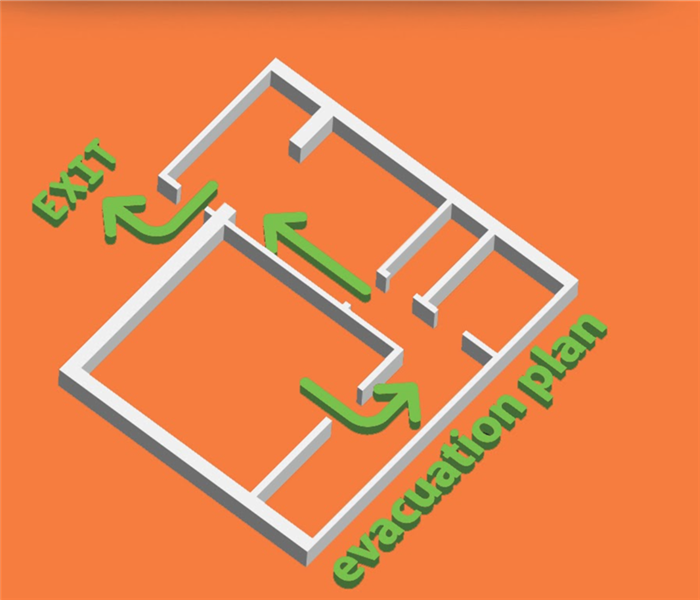 Have everyone follow the fire escape plan as discussed.
Have everyone follow the fire escape plan as discussed.
Three Things to Include in Your Fire Exit Plan
Home fires can be catastrophic and scary, but you can improve your family’s chance of getting out safely if you come up with a fire escape plan in advance. The idea of putting together a detailed, complicated plan can seem overwhelming, so try starting with these three simple steps:
1. Identify All Exits
Print out or draw a floor plan of your home in Blaine, TN. Then mark all exits in a bright color (including all exterior doors and windows). Consider putting a fire escape ladder next to all upper-story windows, and make sure all basement window wells have fire ladders as well.
2. Perform a Drill
When the entire family is present, create an emergency escape plan. Identify areas of the home where fires are likely to occur, then make sure each family member knows the safest ways to exit the home from various rooms (bedrooms, family rooms, bathrooms, etc.)
Next, perform a fire drill and have everyone follow the fire escape plan as discussed. It’s a good idea to perform several drills and change up the location of the fire with each drill. For example, during one drill, the fire could be in the basement. In the next drill, the fire could be in the laundry room. Different escape routes may need to be chosen based on the location of the fire.
3. Establish an After-Fire Action Plan
It’s easy to become separated from loved ones during a fire, so make sure you establish a meeting place outside the home in advance. Your meeting place could be on the street corner or at a neighbor’s house in the event of inclement weather.
As part of your fire escape plan, make sure every member of the family knows the number of the fire department. You may also want to memorize the number of your local fire restoration company and insurance company so you can call them right away. Be sure to notify your family and close friends that you are safe as well so they won’t needlessly worry.
You Need More Fire Alarms
11/18/2021 (Permalink)
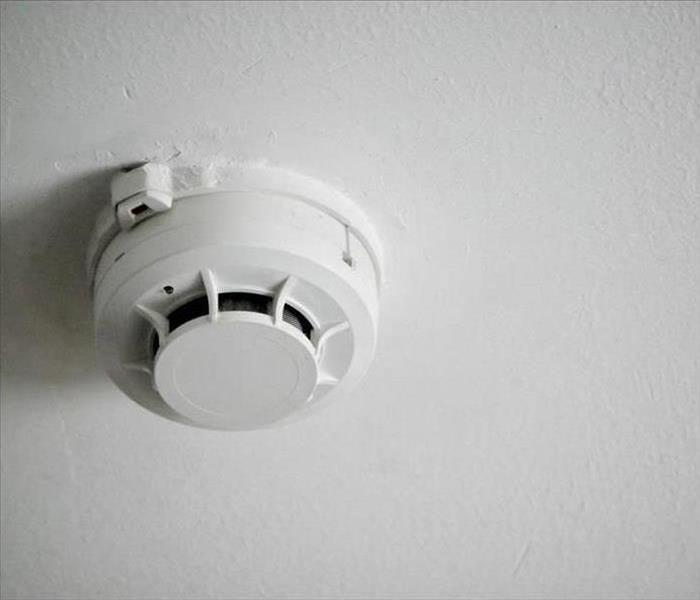 Photoelectric alarms detect smoke while a fire is still smoldering.
Photoelectric alarms detect smoke while a fire is still smoldering.
Smoke Alarms
According to the National Fire Protection Association, there's a 1 in 4 chance that you'll be involved in a home fire serious enough to be reported sometime during your lifetime. When considering the number fires that go unreported in Powell, TN, you'll probably experience at least five. Ready for more facts?
- You only have three to four minutes to get out of a home fire alive.
- Smoke detectors don't always catch fast-moving fires.
- Three out of five residential fire deaths happened in homes without working smoke alarms.
Those are pretty serious numbers. Fortunately, many homeowners have at least one fire alarm installed in their homes even without knowing these startling facts. However, those homeowners probably need more alarms.
Install More Detectors
Maybe you have a detector in the kitchen and in the halls outside of the bedrooms in your home. If you do, that's a good start, but it isn't enough. The National Fire Protection Association advises homeowners to install a fire alarm in every bedroom, outside of all sleeping areas, and on every level of the home (including the basement.) That's at least five alarms, more if you have additional bedrooms and if you have a detector in your kitchen.
Replace Smoke Alarms Regularly
If you haven't experienced any fire damage in your home, your alarm has probably collected a pretty thick layer of dust from inattention. You can improve the cleanliness of the detectors and keep your family safer by inspecting the alarm every month, replacing its batteries twice a year, and swapping out your old alarm for a new one every ten years.
Install Two Types of Alarms
Many homeowners aren't aware that there are two types of detectors available. An ionization alarm is triggered by flames and provides a response even when smoke isn't present. Photoelectric alarms detect smoke while a fire is still smoldering. You need both types of alarms in your home.
Your best chance of avoiding fire and smoke damage is to install and maintain each fire alarm in your home according to fire safety standards. More information may be available from firefighters or fire restoration professionals in your community.
How To Eliminate Cigarette Odors From Your Home
10/7/2021 (Permalink)
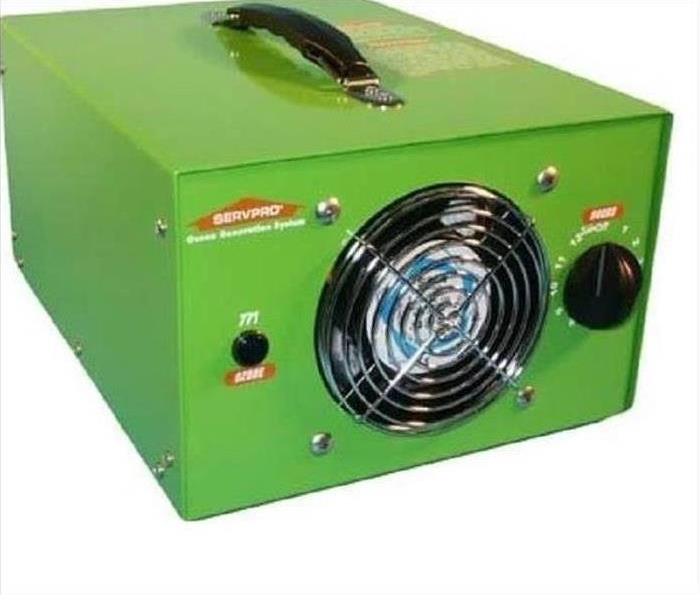 An ozone generator can remove smoke odor from your property.
An ozone generator can remove smoke odor from your property.
How to Get Rid of Cigarette Odors in Your Home
It is commonly accepted that cigarette smoke is an odor that adheres to surfaces when the smoke cloud abates. But the truth is, the smoke is a combination of odorous chemicals that can cling to surfaces for months after the haze is gone. Many people in Mascot, TN, try scrubbing, repainting, and home deodorization to remove the smell, but even after those efforts, the odor can still linger. If the smell haunts you when you enter your home, here are some helpful hints on eliminating it once and for all.
Chemical Compounds
The reason the cigarette smoke sticks to your walls and carpets is that many of the chemicals are solvents that can permeate your home’s surfaces, including wood. When you clean, it often cannot reach the odor-causing chemicals because they can be deep below the layer being scrubbed.
Ozone Treatment
There are no magical odor-removing tools, but ozone home deodorization comes close. As the ozone sprays into the room, it breaks down odors at the molecular level. Ozone can treat:
- Bacteria
- Germs
- Spores
- Microbes
The molecules causing the offensive odor can chemically react with the ozone particles. Therefore, after cleaning the room, the ozone treatment can usually eliminate the remaining unpleasant scents and kill them for good. However, if carpets or woodwork have not been cleaned sufficiently after being in a heavy smoke-laden room, the unpleasant cigarette odor may eventually come back.
Professional Removal
Ozone can be a respiratory irritant, so consider leaving the generator-fueled operation to a professional odor removal crew. If the smell is unpleasant enough, even after cleaning, the ozone treatment may take up to 3 days. During that time, all pets, plants, and people may need to be relocated until the ozone removal crew completes the work.
When lingering cigarette smoke becomes too much, fight back with a home deodorization. Ozone can help remove odors and return your clean-smelling home to you.
Prepare Yourself for Fire Damage
8/13/2021 (Permalink)
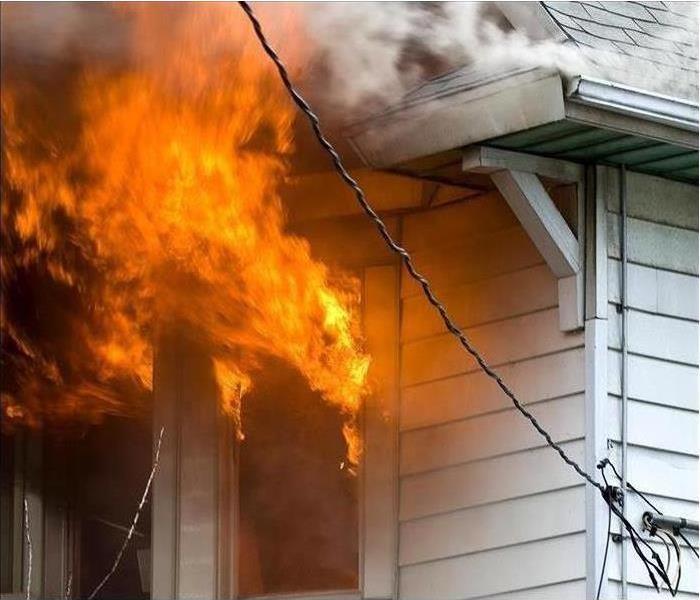 Prepare yourself for fire damages.
Prepare yourself for fire damages.
Tips from FEMA for preparing your family, home, and business from the threat of wildfires:
- Get an emergency supply kit, which includes items like non-perishable food, water, a battery- powered or hand- crank radio, extra flashlights, and batteries. You may want to prepare a portable kit and keep it in your car.
- Make a family emergency plan. Your family may not be together when disaster strikes, so it is important to know how you will contact one another, how you will get back together, and what you will do in case of an emergency.
- Protect your property from wildfires by designing and landscaping with wildfire safety in mind.
- Learn about the emergency service plans that have been established in your area by your state and local government. In any emergency, always listen to the instructions given by local emergency management officials.
- Ask SERVPRO of North Knoxville about starting a Disaster Recovery Plan for your business.
What Can You Expect From a Fire Cleanup?
7/22/2021 (Permalink)
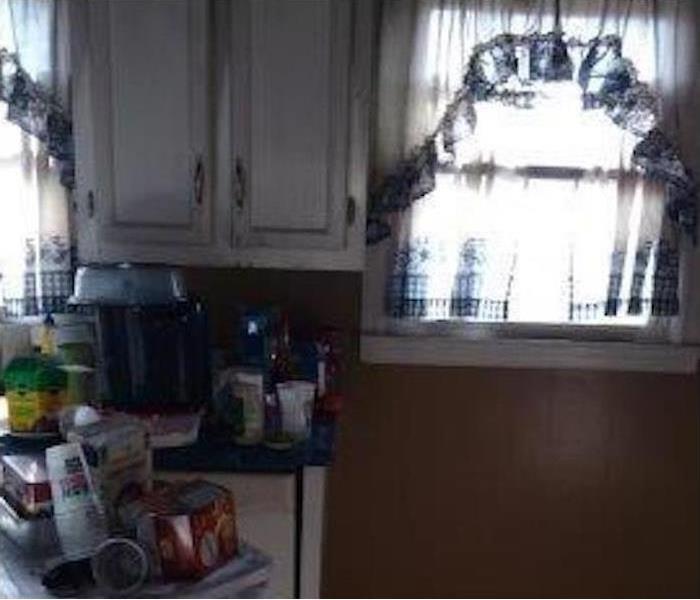 Fire and smoke damage can do a lot of harm to your home.
Fire and smoke damage can do a lot of harm to your home.
What Should You Expect After a Fire?
In Strawberry Plains, TN you may need to go through a fire cleanup after flames have erupted in your home. Calling a residential fire damage crew can make this process easier. However, you may still want to know what to expect before the professionals get to your house. Use this quick guide to prepare for the cleanup techniques used to mitigate fire and smoke damage.
• Assessment: You may want the cleanup to get started as quickly as possible. However, the crew will better know what to do after an initial inspection is done on your house.
• Mitigation: Soot damage isn't the only thing you have to worry about after a fire. The flames can leave your home susceptible to other types of damage. That's why many professionals will board up windows, doors and holes to ensure rain and intruders cannot affect your house. Putting tarps on the roof may also be necessary.
• Removal: The first removal that may be needed is water removal. When firefighters put out flames, they use copious amounts of water to ensure your home does not stay ablaze. Your cleanup crew may need to remove standing water and start drying out your belongings. Next, the team may remove signs of smoke damage from the surfaces in your home.
• Sanitization: An important part of smoke cleaning is the sanitizing of your belongings. Clothes, electronics and furniture may have been affected by the soot, so these items may need to get cleaned by professionals.
• Repair: Once the damaged items have been removed from your home and the other surfaces have been cleaned, the crew has to start returning things to normal. This often means repairing siding, windows, roofing, flooring and walls. Because the team wants you to feel comfortable, this may even include painting walls and installing new carpet.
Fire and smoke damage can do a lot of harm to your home. Residential cleanup crews go through a laborious process to help you get your place back to normal.
How to Prepare Yourself for Fire Disaster
7/12/2021 (Permalink)
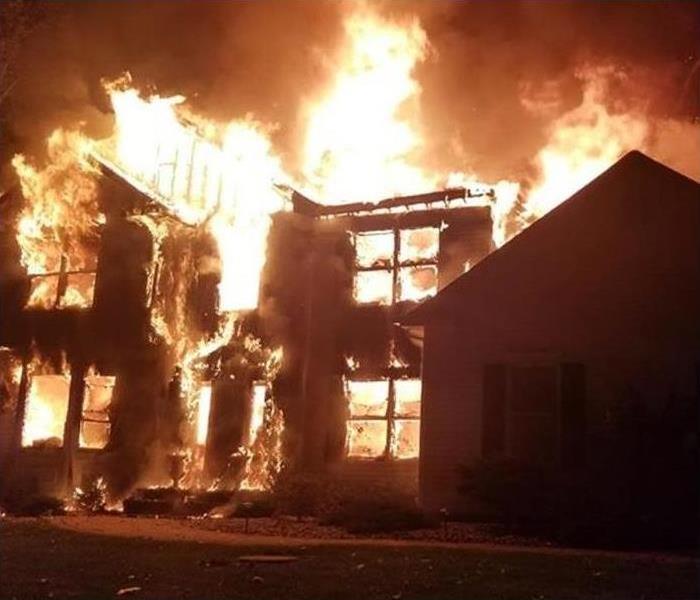 Fire damage in a home.
Fire damage in a home.
Here at SERVPRO of North Knoxville, we are the ones to call if any sort of loss does occur, but we also want to provide our customers and community with resources to minimalize risks that could cause a loss.
Steps to Prepare
The first way to prepare yourself is by knowing where to be the most cautious and aware. The 4 most common types of fires are Kitchen, Electrical, Heater, and Smoking-Related. The Federal Emergency Management Agency (FEMA) reports that in 2018 there were:
- 192,700 cooking fires
- 35,700 heating fires.
- 28,600 Other unintentional, careless fires.
- 25,700 electrical malfunction fires.
The second way to prepare yourself is to be informed about some of the awareness information about fires.
The leading cause of death in a fire is asphyxiation, by a three-to-one ratio over burns. Fire consumes the oxygen in the air while increasing the concentration of deadly carbon monoxide and other toxic gases in the atmosphere. Inhaling carbon monoxide can cause loss of consciousness or death within minutes.
1. The heat from a hostile fire exceeds anything to which a person is normally exposed. A fully developed room fire has temperatures over 1,100 degrees Fahrenheit.
2. Fire generates a black, impenetrable smoke that blocks vision and stings the eyes. It is impossible to navigate through such smoke, so fire drill participants should practice evacuating buildings by at least two routes.
3. Fire generates a black, impenetrable smoke that blocks vision and stings the eyes. It is impossible to navigate through such smoke, so fire drill participants should practice evacuating buildings by at least two routes.
If you want more statistics on residential house fires click here.
Here are the final ways to ensure you are prepared for a fire disaster:
- Develop a Family Disaster Plan.
- If smoke alarms are not already in place, install them outside each sleeping area and on each additional level of your home in accordance with local codes.
- Draw a floor plan of your home; mark two fire escape routes for each room.
- Consider escape ladders for sleeping areas on the second or third floor.
- Burglar bars and locks that block outside window entry must be easy to open from the inside. If a key is required to open bars or locks, keep a key near each window to use for fire escape. Quick-release devices are available for security bars. If smoke or fire is blocking the main exit, you must be able to use your alternate routes quickly.
- Select a safe outside meeting place for everyone to meet after escaping from a fire.
- Conduct a home fire drill at least twice a year with all members of your household.
Cooking Safety Tips for Thanksgiving
11/20/2020 (Permalink)
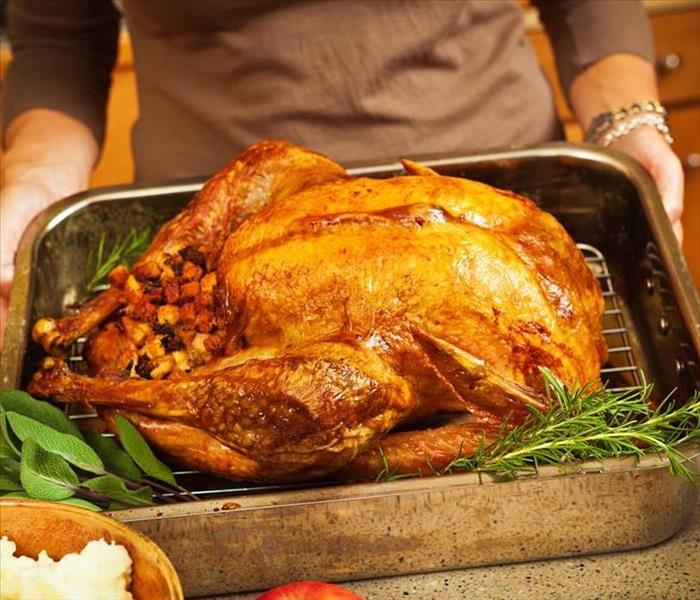 Happy Holidays! Call SERVPRO of North Knoxville, we are open 24/7, 365!
Happy Holidays! Call SERVPRO of North Knoxville, we are open 24/7, 365!
Cooking Safety in Knoxville TN
Cooking caused almost half of all reported home fires and home fire injuries, and it is the second leading cause of home fire deaths in 2014-2018. Here at SERVPRO of North Knoxville we know that the kitchen is the heart of the home, especially at Thanksgiving. Kids love to be involved in holiday preparations. Safety in the kitchen is important, especially on Thanksgiving Day when there is a lot of activity and people at home. Cooking brings family and friends together, provides an outlet for creativity and can be relaxing. But did you know that cooking fires are the number one cause of home fires and home injuries? By following a few safety tips provided by National Fire Prevention Association (NFPA) you can prevent these fires.
Cook with Caution
- Be on alert! If you are sleepy or have consumed alcohol don’t use the stove or stovetop.
- Stay in the kitchen while you are frying, boiling, grilling, or broiling food. If you leave the kitchen for even a short period of time, turn off the stove.
- If you are simmering, baking, or roasting food, check it regularly, remain in the home while food is cooking, and use a timer to remind you that you are cooking.
- Keep anything that can catch fire — oven mitts, wooden utensils, food packaging, towels or curtains — away from your stovetop.
If you decide to fight a small cooking fire...
- On the stovetop, smother the flames by sliding a lid over the pan and turning off the burner. Leave the pan covered until it is completely cooled.
- For an oven fire, turn off the heat and keep the door closed.
If you have doubt about fighting the fire...
- Just get out! When you leave, close the door behind you to help contain the fire.
- Call 9-1-1 or the local emergency number from outside the home.
Happy Holidays from our Team to your family!
Fire Extinguisher Safety
6/11/2020 (Permalink)
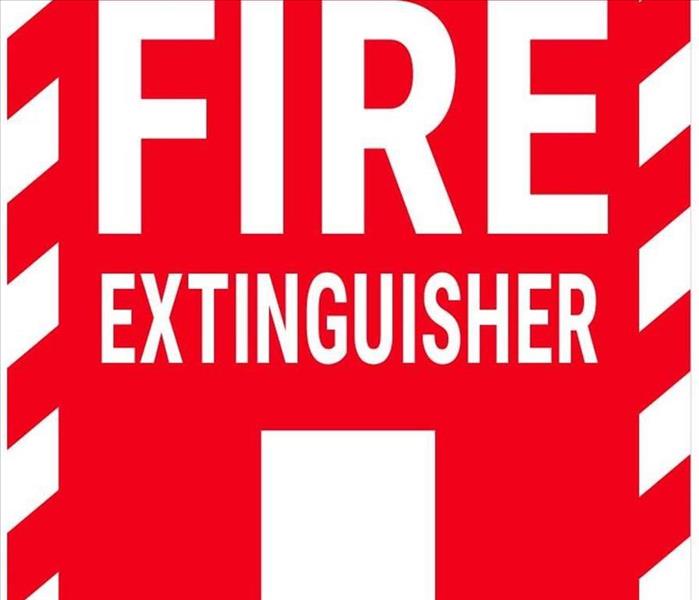 SERVPRO of North Knoxville will make it "Like it never even happened."
SERVPRO of North Knoxville will make it "Like it never even happened."
Fire Extinguisher Safety
A portable fire extinguisher can save lives and property by putting out a small fire or containing it until the fire department arrives, but portable extinguishers have limitations. Because fire grows and spreads so rapidly, the #1 priority for residents is to get out safely. Here is what you need to know about choosing and using fire extinguishers
Remember to Check Your Fire Extinguisher for:
- Easy access in an emergency- be sure nothing is blocking or limiting your ability to reach it.
- The recommended pressure level- many extinguishers have gauges that show when pressure is too high or too low.
- Working parts- make sure the can, hoses, and nozzles aren’t damaged, dented, or rusted.
- Cleanliness- remove any dust, oil, or grease that might be on the outside of the extinguisher.
- Guidelines and instructions- some extinguishers need to be shaken monthly, others need to be pressure tested every few years.
How to Use a Fire Extinguisher
When operating a fire extinguisher, tell remember the word PASS.
- Pull the pin. Hold the extinguisher with the nozzle pointing away from you and release the locking mechanism.
- Aim low. Point the extinguisher at the base of the fire.
- Squeeze the lever slowly and evenly.
- Sweep the nozzle from side-to-side.
To learn how to dispose of a fire extinguisher click here!
SERVPRO of North Knoxville is the one to call if you have a fire loss! We want to assist you to make it "Like it never even happened."
Possible fire hazards at home
12/18/2018 (Permalink)
Did you know that there are more than 360,000 home structure fires each year?
The cold weather often means a higher risk of house fires. his is because people are spending more time at home and indoors from the wintry weather!
Common Fire Hazards at Home
- Candles
- Cigarettes
- Electrical & Lighting
- Dryers & Washing Machines
These fire hazards can be preventable with some forethought and care! The most preventable are are unattended candles and cooking! Be aware of when you light candles or leave the stove on before you leave your home or go to bed.
The most recent fire damage SERVPRO did was "quick and a job well done" stated from a happy customer. She explained a fire had started in the middle of the night and SERVPRO was there that morning removing the damage and making everything smell and look nice!
If you have fire damage call SERVPRO of North Knoxville at 865.947.9992.
Tips for a safe Holiday
12/18/2018 (Permalink)
It is the holidays, so everyone wants to add fun warmth and sparkle to the wonderful season. It is very important to remember that some of our favorite holiday decorations carry a big risk of electrical or a fire if these aren’t used carefully.
Chestnuts are roasting on an open fire, but let’s sure hope your Christmas tree isn’t burning. Every year there are an estimated 200 homes that have had Christmas tree fires. Most of these fires are caused by electrical malfunctions as well as heating equipment.
Safety Tips
- Always keep candles, heaters and fireplaces away from your tree.
- Did you know metal stands cause trees to dry out and become flammable? Always remember to check the water level daily or nightly.
- Inspect lights before plugging them in or putting them up.
- Never overload a circuit.
- Before leaving your house or going to bed make sure to turn off all of the lights.
Always remember that SERVPRO of North Knoxville is open 24/7/365! So if you are in a burning situation during the holidays, SERVPRO will be there to help!
Steps to take in the event of a fire
12/13/2018 (Permalink)
A fire can leave behind soot, smoke damage and a host of other problems.
Ceilings, walls, woodwork, carpeting, and floors will often need a thorough
professional cleaning. If your home or business suffers a fire, it is important to take some appropriate steps. The following tips may help reduce damage and increase chances of a successful restoration.
DO:
Limit movement in the home to prevent soot particles from being embedded into upholstery and carpet.
Keep hands clean. Soot on hands can further soil upholstery, walls, and woodwork.
Place dry, colorfast towels or old linens on rugs, upholstery, and carpet traffic areas.
If heat is off during winter, pour RV antifreeze in sinks, toilet bowls, holding tanks and tubs to avoid freezing pipes and fixtures.
Tape double layers of cheesecloth over air registers to stop particles of soot from getting in or out of the HVAC system.
DON'T:
Don’t attempt to wash any walls or painted surfaces without first contacting your SERVPRO® of North Knoxville.
Do not attempt to clean any electrical appliances (TV sets, radios, etc.) that may have been close to fire, heat or water without first consulting an authorized repair service.
Do not consume any food or beverages that may have been stored close to fire, heat or water, as they may be contaminated.
If the ceiling is wet, do not turn on ceiling fans.
These are just a few tips to follow until SERVPRO of North Knoxville arrives. We are your trusted fire cleanup and restoration company. We are 24/7 and you can reach us at 865.947.9992!
Christmas Trees
11/12/2018 (Permalink)
 Beautiful Natural Christmas Tree
Beautiful Natural Christmas Tree
Holiday season is approaching and who doesn't love the look of a real Christmas tree. Choosing your own tree, cutting it down, and taking it home is a great holiday tradition to start with your family. Live trees really seem to put people in the Christmas spirit and make your house smell amazing! If they are not properly cared for, your Christmas spirit could potentially go up in flames! Here are a few tips for this holiday season:
- Choose a tree that has been freshly cut and has green needles
- Water your tree DAILY to keep it from drying out
- Only use flame retardant lights and decorations
- Ensure there are no frayed wires on holiday lights
- Do not connect more than 3 strands of mini string light sets
- Keep your tree at least 3 feet away from ANY heat source
- Do not block exits with your tree
- Always unplug lights before leaving the house and before bed
- Get rid of the tree when needles start turning brown or stop turning the lights on. This means that your tree is drying out
- Be sure to check that smoke alarms are working properly and that your family knows what to do in case of a fire
While live trees are beautiful, they can be fire hazards. Be sure to take preventative measures, be aware, and be prepared this holiday season to keep your family safe!
Prepare yourself for fire disasters
3/22/2018 (Permalink)
Tips from FEMA for preparing your family, home, and business from the threat of wildfires:
- Get an emergency supply kit, which includes items like non-perishable food, water, a battery- powered or hand- crank radio, extra flashlights, and batteries. You may want to prepare a portable kit and keep it in your car.
- Make a family emergency plan. Your family may not be together when disaster strikes, so it is important to know how you will contact one another, how you will get back together, and what you will do in case of an emergency.
- Protect your property from wildfires by designing and landscaping with wildfire safety in mind.
- Learn about the emergency service plans that have been established in your area by your state and local government. In any emergency, always listen to the instructions given by local emergency management officials.
- Ask SERVPRO of North Knoxville about starting a Disaster Recovery Plan for your business.
Soot and Smoke
3/22/2018 (Permalink)
Wildfires can strike almost anywhere. A wildfire can cause more than just the damage that you see. Even if your windows and doors are shut and your vents are closed, smoke and soot particles can enter your property. Your HVAC units and air ducts can hold large quantities of soot and disperse it all over your belongings.
Although a wildfire will burn mostly natural materials, there are times when wildfires burn man-made materials, which can leave soot particle that are difficult to remove. Even if your property didn't suffer fire damage, there may be soot particles and residues left to clean up. SERVPRO of North Knoxville will pretest the soot residues to determine the best method of cleaning, helping to ensure no lingering odors.
CHristmas Safety Tips
12/18/2017 (Permalink)
Its Finally here! With less than a week until Santa makes his arrival, it is crunch time. It is easy to over look minor details that could potentially cause HUGE problems. Here are a few tips to keep your family safe this holiday season:
- Check all strings of lights to ensure there is no damage and they are working properly
- Be sure to water your Christmas tree often; dry trees will catch fire
- Be sure to put all candles in a hurricane glass and out of the reach of children and pets
- Never leave your fireplace unattended and be sure to keep the screen/door closed to prevent hot coals from popping out
- Be aware of holiday plants that are poisonous to pets and people; keep them out of reach
- Make sure you wash your hands after handling strings of Christmas lights as they contain high amounts of lead
- Be sure to place carbon monoxide alarms around your home
- Keep hard candy and nuts out of the reach of small children as it is a choking hazard
With the busyness of the holiday season, it is easy to over look small details or cut corners to get more done. Be sure to be cautious of potential holidays disasters to keep your loved ones out of harms way this year!
What to do and not to Do with Fire Damage
12/12/2017 (Permalink)
When tragedy strikes, people tend to get emotional and do things they wouldn't if they had been in their right state of mind. The best way to eliminate some of these issues, is by practice. Being prepared for emergency situations enhances the likeliness that you will not be at a total loss. Here are a few tips on what to do and what not to do in a fire damage situation:
Do-
- air out the house to reduce the smoke odor
- discard any open food packages
- limit movement in home to prevent soot particles from being integrated into your upholstery and carpeting
- keep hands clean
- place clean towels on carpet to prevent more soiling
- clean and protect chrome with a light coat of vaseline or oil
- wipe residue from porcelain to prevent etching
- if electricity is off, empty refrigerator completely and prop doors open
- wash off house plants on both sides of leaves
- change air filter on furnace
- remove pets to clean environments
Don't-
- attempt to wash walls without consulting SERVPRO
- use any food or beverages in the home as they may be contaminated
- use upholstered furniture
- turn on ceiling fixtures if ceiling is wet
- attempt to clean carpets or upholstery
- use electrical appliances withing the home
- send garments to an ordinary dry cleaner
- touch anything
It can be overwhelming to see your home is despair and you want to try to do anything to make the situation feel as if it not so bad. Be sure to contact your local SERVPRO to help lessen your stress. As trained professionals, we are here to help and will try to salvage what we can.
Christmas Trees
11/10/2017 (Permalink)
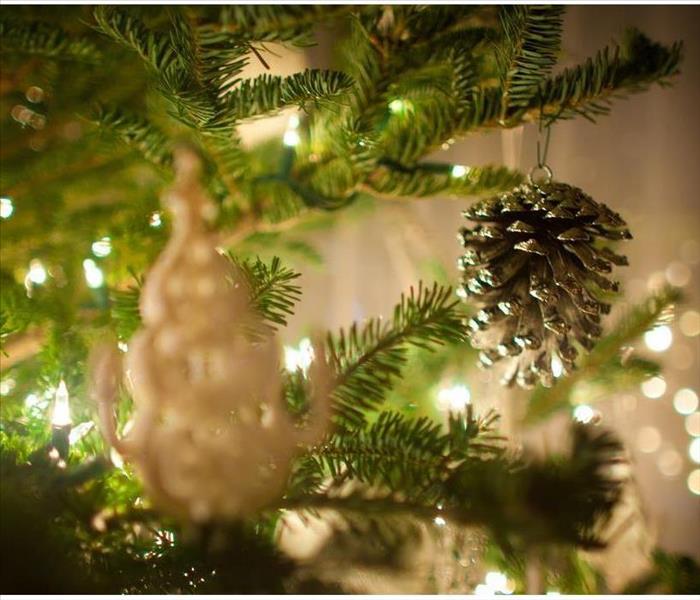 Beautiful, live tree
Beautiful, live tree
Holiday season is approaching and who doesn't love the look of a real Christmas tree. Choosing your own tree, cutting it down, and taking it home is a great holiday tradition to start with your family. Live trees really seem to put people in the Christmas spirit and make your house smell amazing! If they are not properly cared for, your Christmas spirit could potentially go up in flames! Here are a few tips for this holiday season:
- Choose a tree that has been freshly cut and has green needles
- Water your tree DAILY to keep it from drying out
- Only use flame retardant lights and decorations
- Ensure there are no frayed wires on holiday lights
- Do not connect more than 3 strands of mini string light sets
- Keep your tree at least 3 feet away from ANY heat source
- Do not block exits with your tree
- Always unplug lights before leaving the house and before bed
- Get rid of the tree when needles start turning brown or stop turning the lights on. This means that your tree is drying out
- Be sure to check that smoke alarms are working properly and that your family knows what to do in case of a fire
While live trees are beautiful, they can be fire hazards. Be sure to take preventative measures, be aware, and be prepared this holiday season to keep your family safe!
What Type of Fire Was It?
4/19/2017 (Permalink)
What was burned in a fire plays a key role in determining what can be restored and what must be replaced. The professionals at SERVPRO of North Knoxville deal with many different fires on a regular basis.
- Electrical fire- Burning electrical wiring causes smoke damage and a distinct odor which will permeate all porous surfaces.
- Kitchen fire- A kitchen fire can result in heavy soot and heat damage in the kitchen with light soot throughout the house.
- Grease fire- This type of fire causes smoke damage with a greasy film evenly distributed throughout the surrounding area.
- Wood stove fire- This type of fire will have a distinctive odor and distribute smoke and soot throughout a structure.
- Kerosene heater fire- A fire of this type will result in smoke damage with an even appearance and a greasy film on metal surfaces.
- Furnace puffbacks- A malfunctioning furnace blows greasy soot throughout a structure, covering walls and furniture fairly evenly.
- Lightning fire- This type of fire is rare, but lightning strikes on a structure can cause electrical and smoke damage that ranges from very light to heavy.
- Cigarette fire- The most serious damage caused by this type of fire is to furniture. These fires cause heavy smoke damage as the result of burning stuffing and padding.
Soot and smoke damage can be extremely destructive no matter the type of fire. Let SERVPRO of North Knoxville handle your fire restoration emergencies quickly and correctly!
Soot and Smoke
3/22/2017 (Permalink)
Wildfires can strike almost anywhere. A wildfire can cause more than just the damage that you see. Even if your windows and doors are shut and your vents are closed, smoke and soot particles can enter your property. Your HVAC units and air ducts can hold large quantities of soot and disperse it all over your belongings.
Although a wildfire will burn mostly natural materials, there are times when wildfires burn man-made materials, which can leave soot particle that are difficult to remove. Even if your property didn't suffer fire damage, there may be soot particles and residues left to clean up. SERVPRO of North Knoxville will pretest the soot residues to determine the best method of cleaning, helping to ensure no lingering odors.
October is Fire Prevention Awareness Month
10/3/2016 (Permalink)
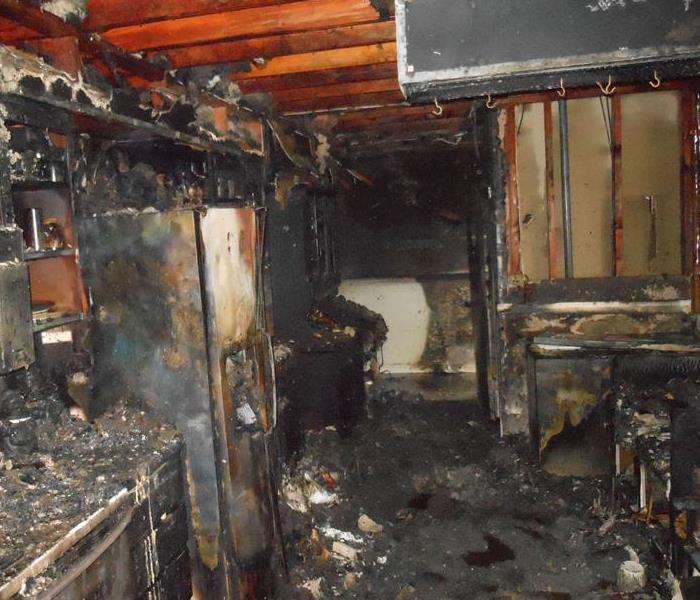 Don't let this happen in your home. But if it does, we're here to make it like it never even happened!
Don't let this happen in your home. But if it does, we're here to make it like it never even happened!
Here are some helpful tips from SERVPRO of North Knoxville & FEMA!
Each year more than 2,500 people die and 12,600 are injured in home fires in the United States, with direct property loss due to home fires estimated at $7.3 billion annually. Home fires can be prevented!
To protect yourself, it is important to understand the basic characteristics of fire. Fire spreads quickly; there is no time to gather valuables or make a phone call. In just two minutes, a fire can become life-threatening. In five minutes, a residence can be engulfed in flames.
Most home fires occur in the kitchen while cooking and are the leading cause of injuries from fire. Common causes of fires at night are carelessly discarded cigarettes, sparks from fireplaces without spark screens or glass doors, and heating appliances left too close to furniture or other combustibles. These fires can be particularly dangerous because they may smolder for a long period before being discovered by sleeping residents.
Home fires are preventable! The following are simple steps that each of us can take to prevent a tragedy.
Cooking
- Stay in the kitchen when you are frying, grilling, or broiling food. If you leave the kitchen for even a short period of time, turn off the stove.
- Wear short, close-fitting or tightly rolled sleeves when cooking.
- Do not cook if you are sleepy, have been drinking alcohol, or have taken medicine that makes you drowsy.
- Keep children away from cooking areas by enforcing a "kid-free zone" of 3 feet around the stove.
- Position barbecue grills at least 10 feet away from siding and deck railings, and out from under eaves and overhanging branches.
Smoking
- If you smoke, smoke outside. Most home fires caused by smoking materials start inside the home. Put your cigarettes out in a can filled with sand.
- Make sure cigarettes and ashes are out. The cigarette really needs to be completely stubbed out in an ashtray. Soak cigarette butts and ashes in water before throwing them away. Never toss hot cigarette butts or ashes in the trash can.
- Check for cigarette butts. Chairs and sofas catch on fire fast and burn fast. Don't put ashtrays on them. If people have been smoking in the home, check for cigarettes under cushions.
- Never smoke in a home where oxygen is used, even if it is turned off. Oxygen can be explosive and makes fire burn hotter and faster.
- Be alert - don’t smoke in bed! If you are sleepy, have been drinking, or have taken medicine that makes you drowsy, put your cigarette out first.
Electrical and Appliance Safety
- Frayed wires can cause fires. Replace all worn, old or damaged appliance cords immediately and do not run cords under rugs or furniture.
- Buy electrical products evaluated by a nationally recognized laboratory, such as Underwriters Laboratories (UL).
- If an appliance has a three-prong plug, use it only in a three-slot outlet. Never force it to fit into a two-slot outlet or extension cord.
- Use electrical extension cords wisely; never overload extension cords or wall sockets.
- Immediately shut off, then professionally replace, light switches that are hot to the touch and lights that flicker.
Portable Space Heaters
- Keep combustible objects at least three feet away from portable heating devices.
- Buy only heaters evaluated by a nationally recognized laboratory, such as Underwriters Laboratories (UL).
- Check to make the portable heater has a thermostat control mechanism, and will switch off automatically if the heater falls over.
- Check with your local fire department on the legality of kerosene heater use in your community.
- Only use crystal clear K-1 kerosene in kerosene heaters. Never overfill it. Use the heater in a well-ventilated room.
Fireplaces and Woodstoves
- Inspect and clean woodstove pipes and chimneys annually and check monthly for damage or obstructions.
- Never burn trash, paper, or green wood.
- Use a fireplace screen heavy enough to stop rolling logs and big enough to cover the entire opening of the fireplace to catch flying sparks.
- Make sure the fire is completely out before leaving the house or going to bed.
- Store cooled ashes in a tightly sealed metal container outside the home.
Children
- Take the mystery out of fire play by teaching children that fire is a tool, not a toy.
- Store matches and lighters out of children's reach and sight, preferably in a locked cabinet.
- Teach children not to pick up matches or lighters they may find. Instead, they should tell an adult immediately.
- Never leave children unattended near operating stoves or burning candles, even for a short time.
- Check under beds and in closets for burned matches, evidence your child may be playing with fire.
More Prevention Tips
- Avoid using lighted candles.
- Never use the range or oven to heat your home.
- Replace mattresses made before the 2007 Federal Mattress Flammability Standard. Mattresses made since then are required by law to be safer.
- Keep combustible and flammable liquids away from heat sources.
- Portable generators should NEVER be used indoors and should only be refueled outdoors or in well ventilated areas.
Smoke Alarms
A properly installed and maintained smoke alarm is the only thing in your home that can alert you and your family to a fire 24 hours a day, seven days a week. A working smoke alarm significantly increases your chances of surviving a deadly home fire.
- Install both ionization AND photoelectric smoke alarms, OR dual sensor smoke alarms, which contain both ionization and photoelectric smoke sensors
- Test batteries monthly.
- Replace batteries in battery-powered and hard-wired smoke alarms at least once a year (except non-replaceable 10-year lithium batteries)
- Install smoke alarms on every level of your home, including the basement. The U.S. Fire Administration recommends installing smoke alarms both inside and outside of sleeping areas.
- Always follow the manufacturer’s installation instructions when installing smoke alarms.
- Replace the entire smoke alarm unit every 8-10 years or according to manufacturer’s instructions.
- Never disable a smoke alarm while cooking – it can be a deadly mistake. Open a window or door and press the “hush” button, wave a towel at the alarm to clear the air, or move the entire alarm several feet away from the location.
For More Information visit https://www.usfa.fema.gov/






 24/7 Emergency Service
24/7 Emergency Service
